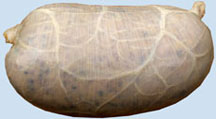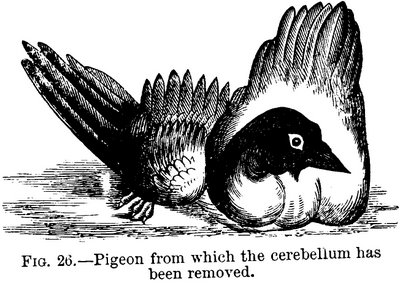Dobson was invited uptown, to the very top of uptown, in Pointy Town, to help adjudge a ranking event. The items to be ranked were rank: bags of filthy laundry, bowls of curdled milk slops, slices of rotting and contaminated offal, and the like. Quite why Dobson was thought to be an adequate judge of such things is a mystery. It is likely that he engineered his invitation as the one chance he had to go to the top of uptown Pointy Town, an exclusive resort peopled by fashionable chancers and a certain sort of plutocrat. It was the kind of place where cummerbunds were worn, and wristwatches glittered.
Dobson is unlikely to have worn either a cummerbund or a wristwatch, but, armed with his invitation, he boarded the “Bucephalusâ€, an engine on the funicular railway connecting the less pointy bits of Pointy Town to the magnificently pointier top of uptown. Gulls greeted him at the station, swooping and shrieking, as gulls do. Oh, those Pointy Town gulls! How one misses their clamour! They still prevailed in Dobson’s day, and he was mindful enough to execute a quick sketch of them in his notebook, since lost, alas.
Puffing up the vertical, the funicular railway was scented, in those days, with lavender and hibiscus, and we can imagine Dobson breathing in those fumes, artificial though they were, as he prepared himself for the unaccustomed role of ranking judge. These contests took place every five years, and those who entered their rank engrubbiments, be they laundry bags or bowls or slices, were a rivalsome crew. There was Taplow, of course, and Scruton and Cribcage and Hooter. Venables and Ricketts, too, and old crumpled Stainforth in his breeches. Not one of them was allowed anywhere near uptown save for when the ranking contest took place. The rest of the time they kept to their middens in some dank, though reasonably pointy, corner of Pointy Town. That was a part of town Dobson knew well, for he often strolled there, of a morning, on his way to see pigs.
But now both Dobson and the rank competitors with their rank bags and bowls and slices and whatnot were gathered in smart and flashy uptown, the very top of it, so pointy that in truth nowhere was pointier. Dobson looked at the scorecard he had been given by the referee, and chewed the end of his pencil. Then he walked slowly among the trestle tables on to which the items to be ranked had been chucked. He hoped he was carrying himself in a suitably authoritative manner, akin to a top judge at, say, a dog show. Dobson had never actually attended a dog show, but he had read a vivid eye-witness account of one in Vivid Eye-Witness Accounts magazine, to which he subscribed and, very occasionally, contributed. So his gait was firm as he toured the tables, and he did much frowning. Slumped and bedraggled on their uptown sofabeds, Taplow and Scruton and Cribcage and Hooter and Venables and Ricketts and old crumpled Stainforth watched and waited. They had no idea that the out of print pamphleteer ranking their rank items was completely baffled and did not have a clue what he was doing. Nevertheless, he began scribbling on his scorecard, boldly and decisively, and then he handed the card to the referee and went to lean against a big pointy plaster of Paris pointy thing, the kind you will only find at the top of uptown.
As was usual at these events, there was a lengthy delay before the referee announced the result. In the sweltering heat, the rank bags and bowls and slices grew ranker still. Netting was deployed to protect them from those fantastic uptown gulls. Dobson had been hoping to use this time for some sight-seeing, but was disappointed to learn from the referee that his duties included leaning against the plaster of Paris pointy thing, completely immobile, until the result was announced. One of Dobson’s most tiresome pamphlets is the one in which he moans on and on about the regular thwarting of his touristy inclinations. If he is to be believed, every time he had his heart set on sight-seeing, someone or something dashed his hopes, be they thunderstorms, defective bus timetables, enormous puddles, recalcitrant flocks of sheep, poleaxed cutty shredders, or, in this case, a jobsworth ranking referee. But Dobson was on unfamiliar ground, in the middle of an arena filled with fancypants Pointy Town uptowners with their cummerbunds and glittering wristwatches. It was a bit like a Spandau Ballet stadium gig, and if you have ever been to one of those you will understand why the pamphleteer was distressed.
And then, at long last, at twilight, the referee clacked his counters and announced the result. There was uproar, from both the crowd and, more violently, from the competitors. It was obvious to all that Dobson had absolutely no idea about the appropriate ranking of bags full of filthy laundry and bowls of curdled milk slops and slices of rotting and contaminated offal. He had, it appeared, simply filled out the scorecard at random, for all his judge-at-a-dog-show posturing.
He wrote a melodramatic piece about the subsequent kerfuffle for Vivid Eye-Witness Accounts magazine, but it was rejected by the editor and the manuscript is lost. All we know is that Dobson was chased out of uptown by Pointy Towners armed with pitchforks and bludgeons, and was never, ever invited back. He was a gloomy pamphleteer indeed for about a week after this sorry episode, but thereafter he perked up by devising a board game called Picnic For Detectives.
His ranking of the rank items was blotted from the record, and it took place again the following day, Blodgett having been jetted in specially to do a proper job of it. In first place, quite properly, was Taplow, who for the next five years wore his prizewinner’s goat-hair trousers with due pride.



